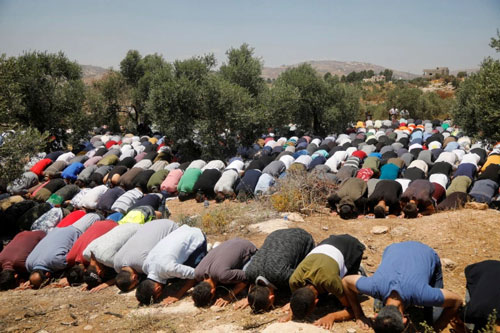Occupied West Bank
This picturesque little town with its narrow winding roads and steep hills dotted with olive trees and stone houses turned into a bloody battleground as Palestinian protesters clashed with Israeli forces over the building of an illegal settlement on their land.
Beita activists called on residents to fight the continuing takeover of their land on Mount Sabih by Israeli settlers, who are currently building an illegal settlement and threatening the livelihoods of at least 17 Palestinian families – more than 100 people – who depend on harvesting their olives on land they have owned for generations.
“Today we had 50 injuries by rubber bullets, 26 wounded by live bullets, 190 cases of tear gas inhalation and 27 other injuries, including beatings,” said Fawas Beitar, a Palestine Red Crescent Society (PRCS) paramedic and coordinator.
“Two of the injuries are serious and involve a live bullet shot into the neck and another live bullet shot into the abdomen,” Beitar told Al Jazeera.
“Several ambulances were targeted by rubber bullets, two paramedics suffered injuries by tear gas inhalation and rubber bullets, respectively.”
a call to action by the Palestinian activists, trouble was already brewing early Friday afternoon before the communal prayers had ended.
In an effort to prevent people from reaching the protest site, Israeli soldiers stopped taxis on the main road between Ramallah and Nablus and forced them to take alternative routes.
This necessitated a circuitous journey on foot and private car through the hills in the direction of a towering, billowing plume of smoke on the horizon where clashes had broken out.
Medics tend to a wounded Palestinian man during a protest against Israeli settlements in Beita [File: Raneen Sawafta/Reuters] the day, groups of young men, observed by journalists on a hilltop, played a game of cat and mouse as they attempted to move down the valley, across a dirt road where Israeli vehicles and soldiers were stationed, and up Mount Sabih towards the settlement to protest.
Two young men with blackened hands, who declined to be photographed for security reasons, told Al Jazeera the settlers made regular raids into Beita – chopping down olive trees, vandalising property and provoking the locals – and had already wounded many young men.
“They will not take our land before they have killed all of us,” Ahmed said. Israeli drones armed with tear gas canisters flew overhead periodically before hovering above the young men and dispensing their loads.
Through binoculars, Al Jazeera observed Israeli soldiers firing towards the young men with live rounds, rubber-coated steel bullets and tear gas.
Ambulances raced past to pick up the wounded, confirming the injuries to waiting journalists before evacuating the patients to a field hospital.
The ambulances, sometimes travelling in convoys, raced backwards and forwards until the early evening when the sound of screaming sirens eventually died down.
So numerous were the injuries that the PRCS turned a local school into a field hospital for emergency treatment including triage, X-rays, and intravenous drips before patients were either released to go home or rushed to Rafidia Hospital in Nablus for further treatment.
Muhammad Khabeisa – whose family has lived in Beita for more than five generations and has lost land to settlers – told Al Jazeera the Israelis had already taken two hectares (five acres) of village land and moved in about 45 prefabricated homes since the beginning of May.
He said villagers asked Israeli authorities for documentation proving their land ownership, which was provided.
However, the documents are only valid for 45 days, Khabeisa noted. “Each time we apply it costs 80 Israeli shekels [$25] and the documents are only valid for 45 days.
So we went again about a week ago to apply for new documentation, but we’ve received no response yet,” Khabeisa said as he showed Al Jazeera the “expired” documentation.
“We then went to the Israeli police to say we wanted to open a case against theft of our land, but were told policemen responsible were not there and told to come back again.—Agencies










